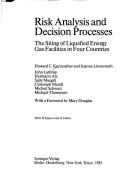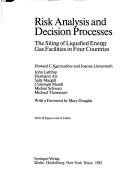| Listing 1 - 6 of 6 |
Sort by
|

ISBN: 3540128042 3642821308 3642821286 9783540128045 Year: 1983 Publisher: Berlin: Springer,
Abstract | Keywords | Export | Availability | Bookmark
 Loading...
Loading...Choose an application
- Reference Manager
- EndNote
- RefWorks (Direct export to RefWorks)
Liquefied natural gas industry --- Liquefied petroleum gas industry --- Risk --- Location --- Decision making --- Environmental aspects --- 614.87 --- #KVIV --- Exposure to ambient influences. Environmental hazards. Personal protection and safety --- 614.87 Exposure to ambient influences. Environmental hazards. Personal protection and safety --- Environnement --- Liquefied natural gas industry - Location - Decision making - Case studies --- Liquefied petroleum gas industry - Location - Decision making - Case studies --- Liquefied natural gas industry - Environmental aspects --- Liquefied petroleum gas industry - Environmental aspects
Digital
ISBN: 9789400722262 Year: 2013 Publisher: Dordrecht Springer Netherlands
Abstract | Keywords | Export | Availability | Bookmark
 Loading...
Loading...Choose an application
- Reference Manager
- EndNote
- RefWorks (Direct export to RefWorks)
Efficient and equitable policies for managing disaster risks and adapting to global environmental change are critically dependent on development of robust options supported by integrated modeling. The book is based on research and state-of-the art models developed at IIASA (International Institute for Applied Systems Analysis) and within its cooperation network. It addresses the methodological complexities of assessing disaster risks, which call for stochastic simulation, optimization methods and economic modeling. Furthermore, it describes policy frameworks for integrated disaster risk management, including stakeholder participation facilitated by user-interactive decision-support tools. Applications and results are presented for a number of case studies at different problem scales and in different socio-economic contexts, and their implications for loss sharing policies and economic development are discussed. Among others, the book presents studies for insurance policies for earthquakes in the Tuscany region in Italy and flood risk in the Tisza river basin in Hungary. Further, it investigates the economic impact of natural disasters on development and possible financial coping strategies; and applications are shown for selected South Asian countries. The book is addressed both to researchers and to organizations involved with catastrophe risk management and risk mitigation policies.
Economics --- Methodology of economics --- Operational research. Game theory --- Probability theory --- Geophysics --- Meteorology. Climatology --- Geology. Earth sciences --- Applied physical engineering --- Business economics --- Production management --- Geography --- waarschijnlijkheidstheorie --- stochastische analyse --- economie --- duurzame ontwikkeling --- geografie --- kwaliteitscontrole --- geologie --- ingenieurswetenschappen --- kansrekening --- natuurrampen
Book

ISBN: 3319720260 3319720252 Year: 2019 Publisher: Cham Springer Nature
Abstract | Keywords | Export | Availability | Bookmark
 Loading...
Loading...Choose an application
- Reference Manager
- EndNote
- RefWorks (Direct export to RefWorks)
This book provides an authoritative insight on the Loss and Damage discourse by highlighting state-of-the-art research and policy linked to this discourse and articulating its multiple concepts, principles and methods. Written by leading researchers and practitioners, it identifies practical and evidence-based policy options to inform the discourse and climate negotiations. With climate-related risks on the rise and impacts being felt around the globe has come the recognition that climate mitigation and adaptation may not be enough to manage the effects from anthropogenic climate change. This recognition led to the creation of the Warsaw International Mechanism on Loss and Damage in 2013, a climate policy mechanism dedicated to dealing with climate-related effects in highly vulnerable countries that face severe constraints and limits to adaptation. Endorsed in 2015 by the Paris Agreement and effectively considered a third pillar of international climate policy, debate and research on Loss and Damage continues to gain enormous traction. Yet, concepts, methods and tools as well as directions for policy and implementation have remained contested and vague. Suitable for researchers, policy-advisors, practitioners and the interested public, the book furthermore: • discusses the political, legal, economic and institutional dimensions of the issue • highlights normative questions central to the discourse • provides a focus on climate risks and climate risk management • presents salient case studies from around the world.
Climatic changes. --- Environmental law. --- Risk management. --- Climate Change. --- Climate Change/Climate Change Impacts. --- Climate Change Management and Policy. --- Environmental Law/Policy/Ecojustice. --- Risk Management. --- Insurance --- Management --- Environment law --- Environmental control --- Environmental protection --- Environmental quality --- Environmental policy --- Law --- Sustainable development --- Changes, Climatic --- Changes in climate --- Climate change --- Climate change science --- Climate changes --- Climate variations --- Climatic change --- Climatic changes --- Climatic fluctuations --- Climatic variations --- Global climate changes --- Global climatic changes --- Climatology --- Climate change mitigation --- Teleconnections (Climatology) --- Law and legislation --- Environmental aspects --- Climate change. --- Environmental policy. --- Environment and state --- Environmental management --- State and environment --- Environmental auditing --- Government policy --- Global environmental change --- Environment --- Environmental law --- Risk management
Book

ISBN: 9783319720265 9783319720258 Year: 2019 Publisher: Cham Springer International Publishing :Imprint: Springer
Abstract | Keywords | Export | Availability | Bookmark
 Loading...
Loading...Choose an application
- Reference Manager
- EndNote
- RefWorks (Direct export to RefWorks)
Environmental law --- Meteorology. Climatology --- Production management --- risk management --- milieurecht --- milieupolitiek --- klimaatverandering --- broeikaseffect

ISBN: 9780387128047 0387128042 Year: 1983 Publisher: Berlin: Springer,
Abstract | Keywords | Export | Availability | Bookmark
 Loading...
Loading...Choose an application
- Reference Manager
- EndNote
- RefWorks (Direct export to RefWorks)
Liquefied natural gas industry --- Liquefied petroleum gas industry --- Risk
Digital
ISBN: 9783319720265 9783319720258 Year: 2019 Publisher: Cham Springer International Publishing
Abstract | Keywords | Export | Availability | Bookmark
 Loading...
Loading...Choose an application
- Reference Manager
- EndNote
- RefWorks (Direct export to RefWorks)
This book provides an authoritative insight on the Loss and Damage discourse by highlighting state-of-the-art research and policy linked to this discourse and articulating its multiple concepts, principles and methods. Written by leading researchers and practitioners, it identifies practical and evidence-based policy options to inform the discourse and climate negotiations. With climate-related risks on the rise and impacts being felt around the globe has come the recognition that climate mitigation and adaptation may not be enough to manage the effects from anthropogenic climate change. This recognition led to the creation of the Warsaw International Mechanism on Loss and Damage in 2013, a climate policy mechanism dedicated to dealing with climate-related effects in highly vulnerable countries that face severe constraints and limits to adaptation. Endorsed in 2015 by the Paris Agreement and effectively considered a third pillar of international climate policy, debate and research on Loss and Damage continues to gain enormous traction. Yet, concepts, methods and tools as well as directions for policy and implementation have remained contested and vague. Suitable for researchers, policy-advisors, practitioners and the interested public, the book furthermore: • discusses the political, legal, economic and institutional dimensions of the issue • highlights normative questions central to the discourse • provides a focus on climate risks and climate risk management • presents salient case studies from around the world.
Environmental law --- Meteorology. Climatology --- Production management --- risk management --- milieurecht --- milieupolitiek --- klimaatverandering --- broeikaseffect
| Listing 1 - 6 of 6 |
Sort by
|

 Search
Search Feedback
Feedback About UniCat
About UniCat  Help
Help News
News